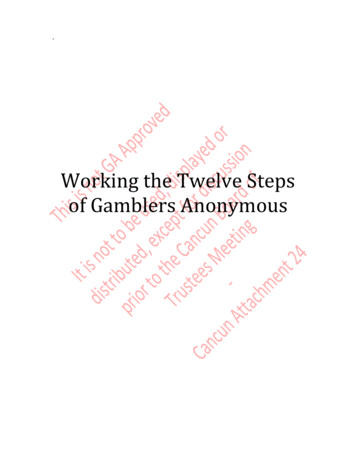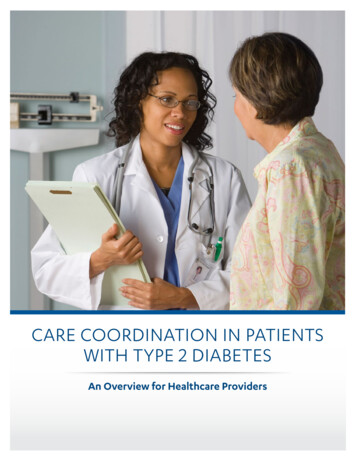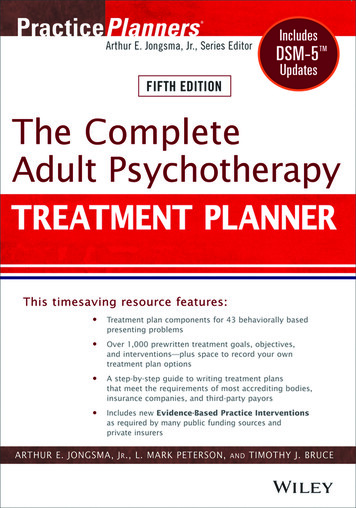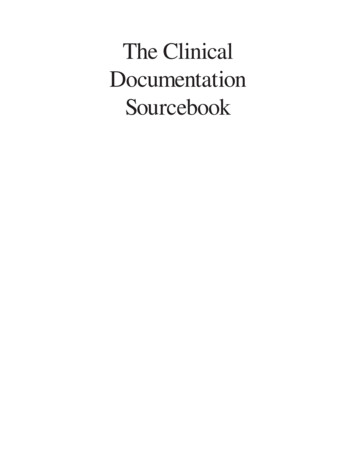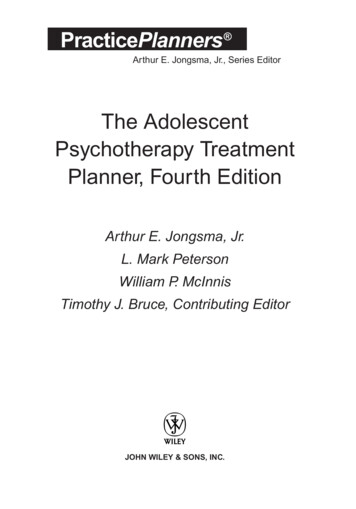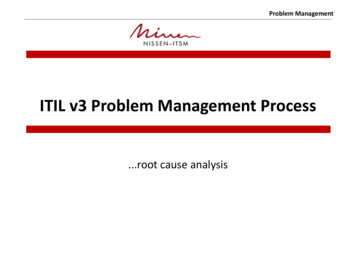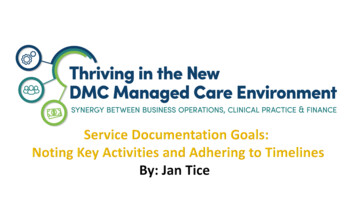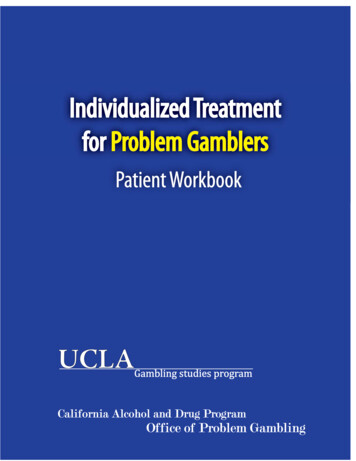
Transcription
Individualized Treatmentfor Problem GamblersPatient WorkbookUCLAGambling studies programCalifornia Alcohol and Drug ProgramOffice of Problem Gambling
Individualized Treatmentfor Problem GamblersPrepared by:Timothy W. Fong M.D.Richard J. Rosenthal M.D.UCLA Gambling Studies ProgramSponsored by:California Office of Problem and Pathological GamblingDepartment of Alcohol and Drug Programs,State of CaliforniaVersion 1March 2009
Table of ContentsIntroduction.1Session 1: Assessment.6Session 2: Dealing With Consequences.15Session 3: Why it’s so hard to stop.20Session 4: Dealing With Urges and Triggers.25Session 5: Lifestyle Changes.31Session 6: Preventing r for Patient CBT Workbook:This Patient Cognitive Behavioral Therapy (CBT) Workbook is designed to assist problem and pathological gamblers in addressing negative consequences and issues that have occurred because ofgambling. This preliminary publication should be used in conjunction with the correspondingTherapist manual. In addition, the workbook should also be used in the presence of and under theguidance of a licensed treatment provider. It is not intended to be used as a self-help workbook. Thisworkbook is currently being evaluated for effectiveness and the results will be made availablethrough the Office of Problem Gambling. There is no representation, warranty, or guarantee that thiscompilation is error-free.
Goals: To learn about this treatment program To learn about pathological gamblingOverview of the ProgramThis manualized treatment program has been designed to help pathological gamblers. Thisprogram has been specifically designed to address the concerns that you, the patient, haveabout your gambling and its consequences. The first session, which you will complete today,will help you and your therapist analyze your gambling behaviors in detail.This book is divided into 6 visits, each offering information and exercises that concerndifferent aspects of your life as it relates to gambling. After each session there will behomework assignments to complete before the next visit. These homework assignmentshave a specific purpose. The assignments provide structure in your recovery to help to keepyou focused on your treatment goals. In addition, the assignments reinforce information andtechniques learned in the previous visit and prepare you for the work to be done in the nextsession.At the end of the 6 sessions, you will have learned some of the basic techniques and thegeneral strategies needed to control your gambling and deal with the consequences thatwere caused by it. Once you have completed this manual with your therapist, it is highlyrecommended that you continue with professional treatment. By no means is this manualthe end of treatment, instead, it is an introduction to the recovery process.1
Frequently Asked Questions about Pathological GamblingWhat is pathological gambling?Pathological gambling is classified as an impulse-control disorder according to the diagnosticmanual used by all psychiatrists and psychologists. This means that people with thiscondition have difficulty controlling their impulses to gamble, even if they do not like togamble. As a result of this lack of control, the individual experiences numerous difficultiesthroughout different aspects of their life from financial difficulties to lies causing problemswithin families. It is also known as compulsive gambling, gambling addiction. Problemgambling is another term used to categorize people who have some problems associatedwith their gambling but do not yet meet full diagnostic criteria.How common is pathological gambling?The prevalence of problem and pathological gambling in the United States has been difficultto determine since many gamblers do not report for help until serious problems arise.Generally, it is believed that about 5% of the adult population is made up of problem andpathological gamblers. About 15% of individuals never gamble, meaning over 10% of peoplethat gamble are at risk of becoming pathological gamblers. These numbers are also expectedto rise with the increase in the number of states allowing legal gambling.In California, according to a statewide survey done in 2005, 1.5% of the state population meetcriteria for pathological gambling while another 2% meet criteria for problem gambling . Thismeans that almost 1,000,000 Californians experience significant life problems from theirgamblingWhat are the causes of pathological gambling?Like other forms of addiction, this answer is not entirely clear. What is known is that there aregenetic and biological risk factors that increase a person’s vulnerability to developinggambling. We also knew that certain personality traits, like being impulsive, competitive anddriven by instant rewards can also increase the risk. Lastly, there are some social risk factorssuch as living close to a casino and being surrounded by friends and family that gamble thatcan also increase the risk of gambling addiction.What we know for sure is that pathological gambling is not caused by greed, lack of ethics,immoral behaviors or selfish behaviors. This is a psychiatric disease where science is showingmore and more that brain functioning in pathological gambling is impaired.2
What are some of the consequences of pathological gambling?Pathological gambling can dramatically affect every aspect of a person’s life. Here areexamples of some of the more common problems created by pathological gambling.1.Financial lossesDebt from gambling can occur quickly and, at times, may seem insurmountable. Knowingexactly how much money is owed, borrowed or spent is an important first step to addressingfinancial losses.2.Loss of interest in regular life activitiesGambling can deprive people of wanting to participate in activities and events that used tobring people pleasure. Things like exercise, going out to dinner, reading a book, or gettingtogether with friends are often given up in exchange for gambling alone.3.Loss of timeOne of the most devastating consequences of continued gambling is the lost time. This canbe due to gambling, getting to gambling venues or planning out how to get money togamble with.4.ToleranceSome gamblers will increasingly larger bets, or greater risks, needed to generate desired levelof excitement. Another way to think about this is escalating gambling by either gamblingmore or longer. Some gamblers even take up other forms of gambling that they didn’tpreviously or find themselves abandoning basic strategies.5.WithdrawalJust like with drug and alcohol withdrawal, some pathological gamblers may experience avariety of physical and mental symptoms when they attempt to slow down or stop gambling.The most common are cravings, and restlessness and irritability. These symptoms may mimicdrug withdrawal, temporary depression or anxiety disorders, or resemble the flu. They aretime and self-limited. Gamblers will rarely require medication. But they may attempt tomedicate themselves through a return to gambling.3
6.LyingLies can be to oneself or to others about the extent or depth of gambling. Lying is also doneas a way of conceal time spent gambling and monies lost. It is partly done to protect thegambling, to be able to keep doing it there is another kind of lying, Lies of omission arecommon7.Criminal BehaviorsResearch has shown that 25% of pathological gamblers will commit some sort of illegal act tofinance their gambling. Most of these crimes tend to be non-violent such as embezzlement,fraud or borrowing money from illicit sources. Why certain gamblers resort to criminalbehaviors while others do not is unclear at this point but the consequences of crime canobviously have devastating and long-lasting consequences.8.Impact on Mental HealthPathological gambling can dramatically affect mood and overall sense of well being. Thereare many emotions that gamblers face but depression, anxiety and suicidal ideation are someof the most serious.Gamblers may gamble to medicate a depression, but there may also be depression as aconsequence of the gambling. The gambling progression includes not just an increase inmonies lost, but also an increase in feelings of shame, guilt, helplessness, and depression. Intime, there may be an inability to sleep, loss of appetite or increased eating, disregard forone’s personal appearance, greater isolation, and loss of interest in everything exceptgambling.As the gambling problem progresses, the gambler typically feels overwhelmed by his debts,his need to conceal the extent of his problems, his increasing isolation, feelings ofhelplessness, and progressive loss of control. Anxiety symptoms, even panic attacks, mayfollow. They typically resolve when the individual stops gambling and starts to accept theconsequences of his or her behavior.Suicidal thoughts may be triggered by gambling losses, and may be in response to feelings ofshame, guilt, and helplessness. Gamblers may have suicidal thoughts on the way home froma losing gambling venture, when they know they will need to confront their spouse or otherfamily members, and they anticipate seeing the look on her/his face, and seeing how one’slosses, and perhaps especially one’s lying, has hurt them. There may be passive suicidalthoughts, in which the gambler wishes they would die of cancer or contract some fatal illness.Others make active attempts, thinking that their families will be better off without them, orwill be able to pay bills by collecting on their life insurance.4
9.Effects on physical healthGambling can have dramatic impacts on physical health. Many pathological gamblers havesimply neglected taking care of themselves. Many do not have any form of health insurance.The ongoing periods of stress can result in increased risk for heart disease, peptic ulcerdisease (heartburn), sleep deprivations, poor nutritional care and lack of exercise.Will I get better with treatment?It has been shown that pathological gamblers who complete treatment or who remain activein treatment can significantly improve their lives. Some treatment programs report that 4060% is able to stop gambling completely. Although this is not 100%, many patients withdiabetes, heart disease and obesity share the same outcome rates. In other words,pathological gambling requires ongoing treatment and will significant help to improvepatient’s lives.5
Goals: To learn more about your gambling patterns To consider your gambling goals To outline a path for moving forward with treatmentExercise #1List your top three, preferred forms of gambling:(Rank them in order of preference)Most preferred: Age that I began:Second:Age that I began:Third:Age that I began:What do you like about these types of gambling?6
What I like about gambling (Advantages)What I hate about gambling (Disadvantages)Reasons I Want to Stop Gambling:7
Gambling budgetResearch has shown that if an individual spends more than 2 percent of his or her annualincome on gambling, this could be a sign of problem gambling.A. Your gross annual income (estimated):B. 2 percent of your annual gross income:(Multiply your annual gross income by .02. This is your estimated gambling budget per year.)C. Estimated gambling budget per month(Divide Total of Line B by 12)D. Actual amount of money spent on gambling last year (approximate)Exercise #2:South Oaks Gambling Screen and National Opinion Research Center NORC DiagnosticScreen (NODS)Please check “Yes” or “No” to the questions below:YesWhen you participate in gambling activities, do you go back another dayto win back money you lost?Have you ever claimed to be winning money from your gamblingactivities when in fact you lost?Do you ever spend more time or money gambling than you intended?Have people ever criticized your gambling?Have you ever felt guilty about the way you gamble or about whathappens when you gamble?Have you ever felt that you would like to stop gambling but didn’t thinkthat you could?Have you ever hidden betting slips, lottery tickets gambling money, orother signs of gambling from your spouse or partner, children, or other8No
important people in your life?Have you ever argued with people you live with over how you handlemoney? If “yes,” have these arguments ever centered on your gambling?Have you ever missed time from work or school due to gambling?Have you ever borrowed from someone and not paid them back as aresult of your gambling?Have you ever borrowed from household money to finance gambling?Have you ever borrowed money from your spouse or partner to financegambling?Have you ever borrowed from other relatives or in-laws to financegambling?Have you received loans from banks, loan companies or credit unions forgambling or to pay gambling debts?Have you ever made cash withdrawals on credit cards such as Visa orMasterCard to get money to gamble with or to pay gambling debts?(Not including ATM cards.)Have you ever received loans from loan sharks to gamble or to paygambling debts?Have you ever cashed in stocks, bonds, or other Securities to financegambling?Have you sold personal or family property to gamble or pay gamblingdebts?Have you ever borrowed money from your checking account by writingchecks that bounced to get money for gambling or to pay gamblingdebts?Do you feel that you have ever had a problem betting money orgambling?To calculate your score: count one point for each “yes” response.0 no problem1 – 4 mild to moderate problem5 – 20 significant problemMy score is:9
National Opinion Research Center NORC Diagnostic Screen(NODS)1234567891010Have there ever been periods lasting 2 weeks or longer when youspent a lot of time thinking about your gambling experiences,planning out future gambling ventures or bets, or thinking aboutways of getting money to gamble with?Circle One:YESNOYESNOYESNOYESNOYESNOYESNOHave you lied to family members, friends, or others about howmuch you gamble, and/or about how much money you lost ongambling, on at least three occasions?YESNOHave you ever written a bad check or taken money that didn'tbelong to you from family members, friends, or anyone else inorder to pay for your gambling?YESNOHave your gambling ever caused serious or repeated problems inyour relationships with any of your family members or friends? Or,has your gambling ever caused you problems at work or at school?YESNOHave you ever needed to ask family members, friends, a lendinginstitution, or anyone else to loan you money or otherwise bail youout of a desperate money situation that was largely caused by yourgambling?YESNOHave there ever been periods when you needed to gamble withincreasing amounts of money or with larger bets than before inorder to get the same feeling of excitement?Have you ever felt restless or irritable when trying to stop, cutdown, or control your gambling?Have you tried and not succeeded in stopping, cutting down, orcontrolling your gambling three or more times in your life?Have you ever gambled to escape from personal problems, or torelieve uncomfortable feelings such as guilt, anxiety, helplessness,or depression?Has there ever been a period when, if you lost money gamblingone day, you would often return another day to get even?
Check the box that most applies to you.Reason for GamblingTo provide excitementTo make money quicklyTo feel like a big shotTo be more social because I felt shyTo not think about problemsTo feel more powerfulTo numb my feelingsTo avoid peopleTo not feel boredTo get rid of my feelings of depression or lonelinessTo feel pleasure or to be entertainedOut of habit11AlwaysSometimesNever
Homework #11.Gambling diaryProblem gamblers typically remember their wins, which feel good. However, they also forget,minimize or make excuses for their losses.Have you kept accurate records of your wins and losses?Some gamblers do in the beginning, but stop when their losses start to accumulate.Using the form on the next page, reconstruct a calendar for the past month, with thefrequency of your gambling episodes, the outcome for each episode, and a total for howmuch money you won or lost.Example:Sunday, June 1st4 hours gambling (slot)Lost12 500
Last 30 turday
Homework Assignment #2:Facing your financial debtMost problem and pathological gamblers have gambling-related debts and are behind inmeeting their financial obligations.Make a list of all your debts, including credit card balances, money borrowed from family andfriends, overdue payments, checks written for which funds were not available, and moneyowed to casinos.List all of your creditors and the amounts owed themCreditorAmount you oweNo matter whom you owe money to, all creditors want to be treated with respect. If you showconcern for paying your debts and you are honest about when you can pay them back, theywill work with you. Avoidance is what bothers creditors most. Let them know that you havemoney/gambling problem at the moment, but if they can give you a few weeks you will beable to figure out a payment plan that will work for both of you. Let them know you intend onfully paying them back.14
Goals: To help you be honest with you family about the money you owe To determine the most pressing debts that have been accumulated and how todeal with them Dealing with legal problems created by gambling Dealing with work / employersJust as the common cold creates a fever, runny nose, sneezing and other issues, multiplesymptoms are exhibited when an individual is dealing with compulsive gambling. Some youmay be more aware of such as the lying you do to cover up your gambling, or the financialproblems that are caused from excessive gambling.This chapter will identify the most common consequences / life problems that problemgamblers deal with so that you can get a better grasp on exactly how gambling is affecting allaspects of your life.15
Dealing with debtThis is a very important step in regaining control of your life. Large debts are a commonreason for relapse. Best to do this slowly and carefully so as to make sure everything is donecorrectly and it is not overwhelming.It is important to remember that financial problems, no matter how severe, are not the end ofthe world. Thousands of gamblers have faced similar circumstances. The steps provided willhelp you resolve your financial problems and learn to handle your finances without gambling.Debts that cause pressure usually fall into 4 categories:1. Debts owed to friends and relatives2. Debts that are collected aggressively through calls from bill collectors, letters fromattorneys, or threats from loan sharks and bookies3. Debts with mounting interest, fees, and late charges4. Debts that may resulting the loss of a car, home, or other important itemMost problem gamblers try to solve financial problems in the familiar way – by gambling. Toremain in control of your life, it is essential that you develop new ways of coping with bills,creditors, and pressure.One major source of pressure can be “hidden debt.” This is the debt you have kept fromothers. You hide it to avoid conflict and criticism. In this case, you usually tell yourself, “I’llhandle this one all by myself. Its better I keep this one hidden.” This is generally a bad idea.The best solution is full disclosure of all your debts to the person most affected by yourfinancial decisions (usually your spouse).The short term consequences of full disclosure may be painful, but they are usually not as badas feared. The long-term benefits are usually many. They include emotional relief, increasedself-respect, and an honest relationship with your partner.It is important that you do this without the financial help of family and friends. For all thegambling debts that you have accrued, you need to take responsibility for those and handlethem without the financial support of others.By not gambling, you will find you have a lot more money available.Option 1Pay a set amount to each creditor each month. Pay it consistently over the short or long-term,depending on what is more comfortable. You may want to pay larger amounts to reduce the16
more pressing debts (for people with relatively small debts that can be paid off in the next 110 years).Option 2:Prioritize and postpone. If you can’t pay off something to each creditor each month, you’llneed alternative methods to relieve financial pressures (for relatively large debts that can’t bepaid off within 5-10 years). Negotiate with creditors for reduced payments, reduced liability, or suspension ofinterest or late charges. This works with some creditors from bookies, to banks, tocredit card companies.Remember that it is most important that you not gamble. Financial problems will take time toresolve but by not gambling, you can resolve them, no matter how large.GA offers a “pressure relief” session that assists in the financial stabilization process. If necessary,contact a lawyer if you are considering bankruptcy.Dealing with casino debtMany casinos have their own collections department with a person familiar with recoveringpayments from recovering gamblers. Contact them immediately to let them know of yourintention to pay them. It may help to tell them you are receiving help for your gamblingproblem.Ask to be excluded from the casino by signing a self-exclusion agreement. This will show howserious you are about stopping. Also ask to be removed from all promotional mailing lists forthe casino.Bookies and loan sharksThe primary goal of bookies and loan sharks is to make money. For this reason, they are oftenwilling to accept long-term payment plans like other creditors. Long-term GA members called“Trusted Servants” have a great deal of experience working with bookies and loan sharks.They may try to intimidate you but these threats are only meant to strengthen your resolve toaddress your debt to them. Don’t ignore or insult your bookies but be humble and dignifiedwhen you speak with them. If threats continue or if actual harm is done, contact the policeimmediately. Often, GA members have a lot of experience handling threats; call them foradvice.17
Dealing with the IRSDelinquent federal taxes incur large penalties and late fees make this debt one of the mostexpensive and troubling. Address it as soon as possible. If you are concerned about criminalprosecution, speak to a CPA. They can refer you to a tax attorney, if needed. The IRS usuallytries to work out 36-month payment plans if your financial circumstances allow this. If not,they will develop an alternative plan based on your income and debt.There is a special program for people whose medical problems prevent them from workingand paying. Pathological gambling IS a psychiatric condition, meaning you may qualify forthis special repayment program.Unattended financial problems, particularly with the IRS, only worsen with age. Take care ofthem as soon as possible and be honest with them.Dealing with family membersBe honest and tell your family about your gambling. Tell them where all the money went. Tellthem about your treatment and what you are doing and learning. Invite them to GA or GamAnon.Sometimes family members are initially angry but it is usually short-lived. If you are honestand continue making a sincere effort to stop gambling and manage your debts, your familywill regain their respect for you.Strong expressions of anger and fear don’t mean they don’t want to help you; expect strongemotional reactions. Accept them and continue to address the financial issues.Make sure your family knows that when you are developing a payment plan that the family’swelfare will always come first. Debt payments do not start until after household expenses aremet.18
Homework #3Consequences ofGamblingFinancialPersonalLegalWork / SchoolFriendsFamilyMedicalEmotional / Psychological19Current problem I have todeal withWhat am I going to do toaddress these problems?
Goals: To learn about the distorted thoughts you have about gambling To acknowledge the problems erroneous thoughts can cause To learn why superstitions aren’t trueMany gamblers have distorted thoughts when it comes to gambling. Even the mostintelligent pathological gamblers will forget what they know about odds and superstitionswhen they are gambling. This chapter will help you to identify the irrational thoughts thatyou have when you decide to gamble. Furthermore, it will help you think rationally aboutyour gambling so that you can manage urges to gamble.Distorted thoughtsOur brains are conditioned to look for patterns and to make predictions based on what hashappened.This does not work for gambling. It is hard not to believe that a machine is “due,” althougheach play is an independent event. The slot machine, dice and cards do not have a memory. Ifheads came up eight times in a row on a coin flip, the ninth flip of would not favor tails.However, it is hard to accept that the odds are still only 50-50.The Gambler’s Fallacy states “past results do not affect the probability of future events.” e.g.chances of having a boy after 7 girls is still 50%.Some people gamble because they encountered a big win at some point. This leads tofeelings of excitement, control, and empowerment, which keep the gambler coming back Theanticipation of another big win is what is alluring.This leads to thoughts like: 20This is my lucky ticketThis is going to be THE lucky deckThis is MY machine
Illusion of Control: SuperstitionsAdditionally, the amount of skill involved in gambling is often overestimated, while luck issomething people believe they can influence or change. Many gamblers are extremelysuperstitious. For example, some believe they can control the dice, while some refuse togamble on the thirteenth day of the month. “Ritualistic or magical thought and actionsbelieved to have the power to overcome chance.” They give gamblers reason to believe theycan predict or control outcomes in games of chance.What are your superstitions? Please write them below and try to provide evidence that theycan influence the outcome:My superstitions about gamblingEvidenceA key to “regaining control is to recognize that you have no control over chance and nothingyou do will increase your chances of winning.” Most forms of gambling are designed to giveyou an illusion of control when there is no control to be had over the outcome of the game.For example, in slots, the amount wagered can change the potential payout but will not affectthe overall odds of winning.Or, if you play craps, there are gamblers who believe that they can control the dice bythrowing it a certain way.Some people compensate for these kinds of thoughts by telling themselves: I’m luckier than most people. I’m smarter than other gamblers. I can change my luck. I can throw dice and have any number come up at willThe more desperate a gambler becomes, the more convinced the gambler is that theseillusions are reality.21
Distorted thoughtsThese are some of the examples of some of these distorted thoughts about gambling areincluded below.Check all the ones that you have used while gambling or planning to gamble.I’ll just play for a little while.One bet won’t harm me.Gambling is an easy way toearn money.I’m smart; I have a system tobeat the odds.I will pay it back.Someday I’ll score a really bigWin.I can’t lose on my birthday.Other:I deserve to gamble.I might actually win this time.And, how can I win if I don’tplay?My gambling is under control,I’ve just had a lot of bad luckrecently.Gambling will be the solution tomy problems.Gambling makes me feel better.I can win it back.I am smarter than the othergamblers.Other:What Cognitive Distortions Lead To: Intense FeelingsThe reasons why irrational thoughts about gambling are so important are that they lead oneto have powerful feelings which then lead to behaviors. These feelings can be both positive,negative or both at the same time.Think about some of the past thoughts about gambling and what feelings did they bring up?Thoughts about gamblingExamples:This time will be different.I deserve to gamble after a hard dayat work.22Feelings CreatedHope, optimismRelief, looking forward to escape
Developing alternative thoughtsOnce those feelings are created, they ultimately lead one to gamble. This is especially true ifthey are negative feelings and if one does not have a lot of coping skills to deal with them.One technique to ultimately change gambling behaviors is to stop those powerful feelingfrom ever developing. One way to stop them from developing is to develop alternativethoughts to the first set of cognitive distortions.Developing these thoughts requires time, mindfulness and paying attention to what you aredoing and saying about gambling, mainly to yourself.Complete this chart that allows you to recognize the erroneous cognitions that affect yourgambling, to develop skills for challenging and casting doubt on erroneous thoughts, and tounderstand and realize that you have the power to decide to gamble or not.Example:23AutomaticThoughts“I need to getaway to thecasino to relax”AlternativethoughtsI can relax in otherways instead ofgoing to the casino“No one loses ontheir birthday”Odds of losing arethe same every dayof the yearNew BehaviorOutcomeGo to the gym,go to a GAmeeting, talkwith myspouseMake birthdayplans ahead oftimeNot gamblingwhen I amangry.No gamblingon mybirthday
Homework #4Fill this out for the la
compilation is error-free. . reading a book, or getting together with friends are often given up in exchange for gambling alone. 3. Loss of time One of the most devastating consequences of continued gambling is the lost time. This can . Have you ever hidden betting sli
